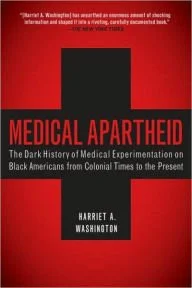Every once in a while, I read a book that does more than provide insight but offers a radical update to how I understand the world. Medical Apartheid: The Dark History of Medical Experimentation on Black Americans from Colonial Times to the Present is one such book. While I expected to read a history of inequities and discrimination, the degree of intentional experimentation and abuse in the name of research or even care was alarming to me. As someone who has committed to learning about differing experiences and racial injustice, I realized, yet again, how much I have to learn.
Washington provides a history of how Black Americans have experienced the healthcare system in the United States. The chronical starts from the early days of slavery, through reconstruction, the pre-civil rights era, and continues up through the modern era. The book covers a range of topics, including the forced sterilization of Black women, unethical medical experiments on Black prisoners and mental health patients, and the exploitation of Black bodies for medical research. She reveals how, throughout time, supposed healing professionals have been able to wrap a narrative of good intention around abusive, discriminating, and inhumane atrocities. The book provides detailed examples, describing how the often-cited Tuskegee Syphilis Study was not an egregious anomaly, but rather a single example among a broader landscape of abuses.
The book also highlights some more failures of our modern-day systems designed to prevent such abuses. Some examples are direct, such as with failures of Independent Review Boards (IRBs) to preserve research ethics. Others are more systemic, such as how research using subjects that are poor, incarcerated, or otherwise disempowered, disproportionately burdens people of color. Medical Apartheid was published in 2006, and I would be interested to learn how some of these dynamics may have shifted, or not, since then.
There were sections of this book that were extremely painful to read. I admire the thoroughness of the research and found myself marveling at how difficult it must have been for the author to read through all of the personal accounts referenced in order to write this book. But, as I made my way through, I was both riveted and committed. If others could live through the stories shared in this book, the very least I could do was learn of their experiences.
For those interested in health equity, I highly recommend Medical Apartheid. It’s meticulously researched, brilliantly written, and provides essential context to many of the lingering inequities today. And when you do, or if you already have, I’d love to hear your thoughts!
https://www.penguinrandomhouse.com/books/185986/medical-apartheid-by-harriet-a-washington/


